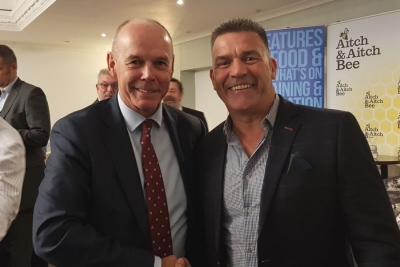I was fortunate enough this week to attend a dinner event with Sir Clive Woodward OBE. The first professional coach of the England Rugby Union team, Clive, as he prefers to be addressed, famously steered the team to triumph at the Rugby World Cup in 2003. But you already knew that.
What you may not know is that following his time at England RFU, Clive went on to manage the British and Irish Lions on their tour of New Zealand in 2005 followed by a term as Director of Football at Southampton Football Club. His next appointment in 2006 was as Director of Elite Performance for the British Olympic Association.
During the evening, Clive gave many insights into his time and experiences in his various roles, and in particular as the England Rugby coach. One message was very clear throughout however and Clive repeated it several times, “Great teams are made of great Individuals.”
He expanded on this in more detail, explaining how crucial it is that everybody in a team is fully capable and competent at doing their job, to the extent that the other team members are able to rely on them without question. Otherwise he explained, things just fall apart.
Clive was really able to drive this point home through an anecdote he recounted about a team-building exercise he undertook with an early version of the England Rugby squad at the headquarters of the Royal Marines. An officer took Clive to one side and suggested that some members of the squad wouldn’t make it as a marine. As he succinctly explained it “you don’t get on the helicopter with someone who can’t do their job.”
When clients approach us with staff performance issues because someone isn’t doing their job, we look at a number of things; capability, conduct and motivation.
Is the individual capable of doing their job? Do they have the necessary skills and abilities to fulfil their duties? If not, can this be fixed with appropriate training or are they never going to cut the mustard?
If they are capable, then perhaps the problem is conduct. Is the individual an inherent troublemaker, lazy or have a bad attitude? Is their performance being affected by the behaviour of another team member?
Perhaps the problem is motivation. Representing your country in your bid to win the greatest prize in your sport is probably motivation enough for most rugby players. Employees have a tendency to require motivation in other ways and remuneration is only part of the answer. For example, as managers, we are responsible for applying the most appropriate management style to the employee’s level of ability for any particular task. Our Situational Leadership training has this down to a tee.
Getting the most from your team through the effective management of individuals is a message that we continually echo. Our training courses have something for all levels, including the team members themselves. And at the moment we can offer it totally free to businesses in Gloucestershire and Worcestershire. Call us on 01452 331331 or at This email address is being protected from spambots. You need JavaScript enabled to view it. to find out how to get your hands on it and start building great teams like Sir Clive Woodward.




